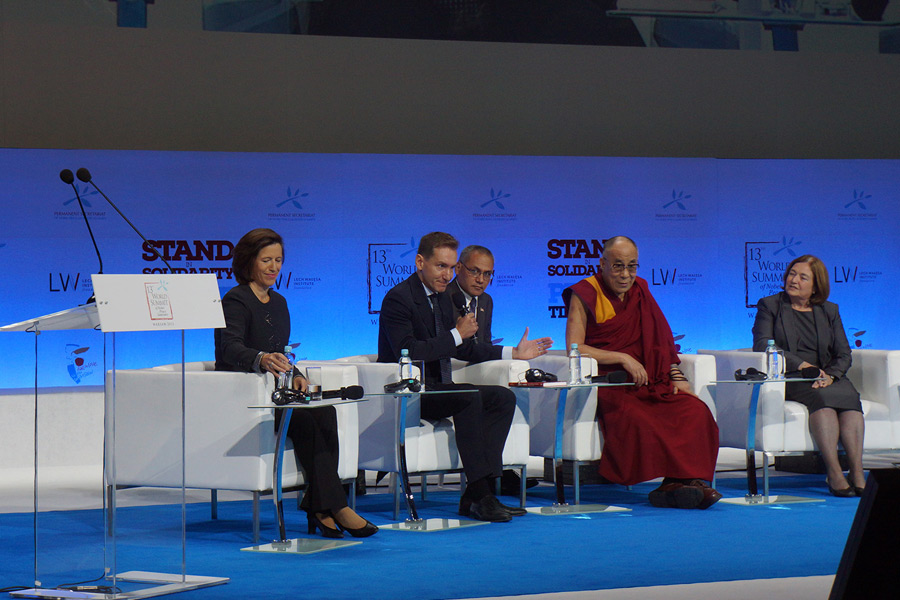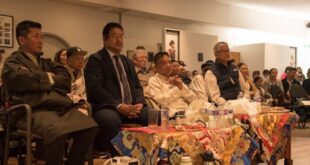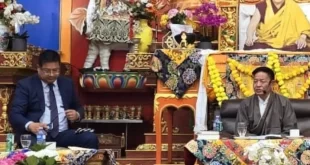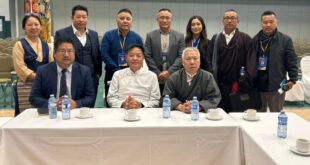October 24, 2013
Warsaw, Poland, 23 October 2013 – When His Holiness the Dalai Lama arrived at Warsaw airport from New York yesterday, he was received by Tibetan Representative Thubten Samdup and Health Kalon, Dr Tsering Wangchuk who did his medical training here, speaks Polish and is familiar with the city. Received at the hotel by a large number of Tibetans, Mongolians and local well-wishers, he was given a traditional Tibetan welcome. He was then pleased to encounter fellow Nobel Laureate Mairead Corrigan Maguire in the lobby.
He is in Warsaw, city of free people, to attend the 13th Nobel Peace Laureates’ Summit. But before driving to the National Opera House where it was taking place today, he was interviewed by Jackec Zakowsk of Polish Television. To the opening question, are you happy? His Holiness replied that he sleeps well, he is relaxed and he is happy. Pressed again to say whether he is happy with his life, he answered:
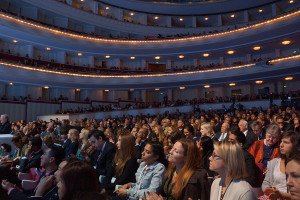
“I have some of the aches and pains that come with old age, but these are not so important beside the development of peace of mind. I am just one among 7 billion human beings and I try to make known that the ultimate source of happiness is within ourselves.”
Asked if that means you can be happy if you try, he quoted the 8th century Indian Buddhist master Shantideva’s advice that if you can overcome a difficulty you should try to do so and if you judge that you cannot overcome it, there is no use in worrying about it; a very practical guideline. The interviewer wanted to know what it felt like as a little boy to be recognised as the Dalai Lama. His Holiness replied that his mother told him that he was excited from the start of the day on which the search party came to the house. They arrived, examined and tested him and when they were about to leave he wanted to go with them.
Session 5 of the summit, whose theme was ‘Solidarity and Reconciliation: No More Wars’, was attended by His Holiness, Nobel Laureate Mairead Corrigan Maguire and UN High Commissioner for Refugees, Melissa Fleming. The moderator suggested that while we could feel optimistic about how Poland has grown in the last 25 years, we might be pessimistic about the rest of the world. Melissa Fleming took this up, agreeing that the world is in worse shape in that there are more refugees than ever. The number of refugees in the world at 45 million is greater than the 38 million population of Poland. She said we must do what we can to stop the wars that are a cause of this and help the vulnerable.
His Holiness highlighted a change in the way of thinking between the early and late parts of the twentieth century. In the early decades, if a nation went to war, almost every citizen was proud to join up. This has changed. He drew attention to the millions who demonstrated on the streets around the world, opposed to war against Iraq.
“People are increasingly aware that violence brings additional suffering, so the only solution is to talk to change your opponent’s mind. The desire for peace has grown. Meanwhile appreciation of the value of affection has also increased with scientists acknowledging that inner peace is essential if we are to be happy and physically well. Therefore, I remain hopeful.”
Mairead Maguire added that in 1976 people in Northern Ireland said no to violence and since then she has seen and joined with people working for non-violent solutions in many places; that is the solution.
When the moderator asked if intervention is or is not helpful, His Holiness replied:
“Basically the use of force is a mistake. After the September 11th tragedy, on September 12th I wrote to Mr Bush, who I know well. I expressed my heartfelt condolences and my hope that any response would be non-violent. My concern was that once hatred and anger are involved the use of physical force never ends the problem.
“The twentieth century was an era of bloodshed and immense violence and yet the Berlin Wall and Marcos government in the Philippines were brought down by people’s power. I hope therefore that the present century can instead be a century of dialogue. As I said at the summit in Hiroshima, world peace will not come about simply through prayer but through action. If we have the will we can create world peace.
“I hope this meeting has provided guidance to the younger generation today, you who truly belong to the twenty-first, in ways to end violence. This is what we must think about. If we consider other people as our human brothers and sisters there’ll be no room to harm or exploit each other. We have to come to think of every one of the 7 billion human beings as part of ‘us’. I believe it’s important that today’s younger generation try, because the twenty-first century is likely to be a turning point in the life of humanity.”
Turning to the crisis in Syria, the moderator asked how we can help. Melissa Fleming replied that half the refugees are children, whose schooling has been disrupted. We can offer them help and support. His Holiness said we have to address the source of the problems that produce refugees. As a refugee himself for more than 50 years he said the important factors are self-confidence and hard work. Regarding the gap between rich and poor, he suggested that while it’s appropriate for the wealthy to provide help and facilities, the poor need to gather their strength, build their self-confidence and take advantage of such assistance.
Mairead Maguire reminded the meeting that every man, woman and child has a right not to be killed and each of us has a duty not to kill anyone else. She praised the model of non-violence that His Holiness and the Tibetan people have brought to their struggle. His Holiness responded that non-violence is effective. He cited the growing numbers of Chinese intellectuals and ordinary people showing sympathy for the Tibetan cause, support that would vanish if Tibetans turn to violence.
“We Tibetans wish to modernize Tibet, but the Chinese must give us the opportunity to take care of our own affairs, then we’ll be able to protect our language, religion and culture, which is a culture of compassion and peace. As a historically Buddhist country, China can benefit from our Buddhist culture. Meanwhile, mindful that several of Asia’s major rivers rise in Tibet, affecting 1 billion people, we also need to be able to protect our environment. It’s difficult to predict what will happen, but the Tibetan spirit remains strong.”
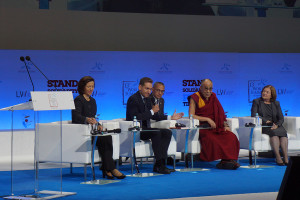
As the session came to a close, Melissa Fleming clarified that the UN has two roles: political activity focussed in New York and humanitarian work centred in Geneva.
When Session 6 – ‘Youth & Solidarity: Be an Advocate for Peace’ began soon afterwards, His Holiness was joined by Nobel Laureates Betty Williams, Prof Muhammad Yunus and Peter Launsky-Tieffenthal, UN Under-Secretary General. His Holiness, asked what the theme meant, replied:
“World peace must begin with inner peace within individuals; we need a sense of the oneness of humanity. This requires education.”
Betty Williams said you have to work for peace. Peace is about action. She said she has learned that she can transform her anger into positive action. She appealed for everyone to lobby their governments to give one percent of their military budgets to the cause of peace and welfare. Muhammad Yunus called for the elimination of poverty and unemployment. He said we need to imagine a better world and then work to fulfil that vision. Young people have to believe they can change the world.
The moderator asked His Holiness whether the 129 people who have committed self-immolation in Tibet had lost hope. He answered:
“These sad incidents show that the people involved believe in non-violence. These people are not drunk or overwhelmed by family problems and they could have turned to violence against others. Instead they chose to sacrifice themselves. Tibetans remain committed to non-violence.
“Before the Tiananmen event took place, despite our efforts to reach out to Chinese, we had difficulty attracting their support. Since then it has been easier and Chinese scholars, artists, even retired army and government officials have expressed sympathy. Wherever there are Tibetans we try to set up Sino-Tibetan friendship groups. When I’ve spoken to Chinese who were demonstrating against me I’ve found they are completely ignorant about the real situation. Everyone knows we are not seeking independence and yet Chinese government propaganda persists in depicting me as a ‘splittist’.”
Betty Williams mentioned that with regard to peace there’s always something every human being can do. Peter Launsky-Tieffenthal drew attention to the UN chemical weapons inspectors currently working at some risk in Syria. Talking about the exploitative garment industry in Bangladesh, Muhammad Yunus proposed that companies and customers alike would approve products being certified exploitation free. He added that he believed that if there were a clear explanation of why, they would also be prepared to add one dollar to the retail price of garments. That small price rise would allow the women who make the clothes to be paid a proper minimum wage and be provided with health insurance and day care for their children.
Betty Williams asserted that peace is up to every one of us. Peter Launsky-Tieffenthal suggested we each ask ourselves, does what I do make a difference? Muhammad Yunus reminded the meeting of the Millennium goal to reduce poverty by half by 2015 and to eliminate it by 2030. His Holiness remarked that the quality of every human activity depends on our heart. If we have a good heart and concern for others, our actions will be positive. He added that taking responsibility is not something that can be imposed, it has to be voluntary. He teasingly referred to young women’s use of cosmetics to make themselves beautiful and suggested that much more important for living a happy life and creating a happy family is inner beauty.
“It’s inner beauty that brings people together and gives rise to genuine, warm smiles.”
After a convivial lunch together the Nobel Laureates reconvened for the Peace Summit Award ceremony. Betty Williams introduced this year’s recipient, actor Sharon Stone, celebrated for her dedicated contribution to work involving HIV/AIDS. Then she, Shirin Ebadi and His Holiness jointly presented her with the award. Sharon Stone gave a stirring speech explaining her work and expressing her gratitude for this appreciation.
During the closing ceremony FW de Klerk read the Nobel Laureates joint statement calling for a new realism based on non-violence and peace and appealing to people everywhere to summon the courage to stand up for peace and make change happen. President Lech Walesa and Mayor of Warsaw Hanna Gronkiewicz-Waltz also spoke. Cape Town, South Africa was announced as the venue of the 14th Summit next year.
At the press conference that followed de Klerk said it is sometimes difficult to come up with practical guidelines at such meetings but channelling inspiration was important. His Holiness stressed that creating peace involves everybody. Shirin Ebadi asked that we do not forget Liu Xiaobo, the Nobel Peace Laureate incarcerated in China, an appeal reiterated by Mairead Maguire. Betty Williams remembered the dreadful loss of 3000 lives on September 11th 2001, but drew attention to the more than 35,000 children who have died of malnutrition every day since then. Muhammad Yunus repeated his call for the Millennium goal to reduce and eliminate poverty to be observed, adding that unemployment should be eliminated too.
The final act of the summit was for Lech Walesa, Mairead Maguire, Shirin Ebadi, Betty Williams and His Holiness to accompany Mayor of Warsaw Hanna Gronkiewicz-Waltz to Saxon Garden to plant a tree together that will grow in memory of this summit.
